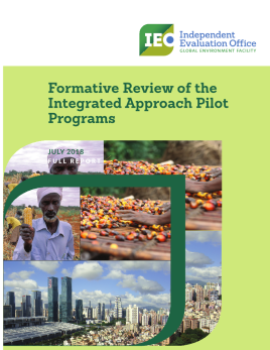This evaluation is a review of the three Integrated Approach Pilots introduced in GEF-6. They were designed to implement integrated programming as a means of achieving systemic change at scale by addressing the major drivers of global environmental degradation in a holistic way. They are:
- The Sustainable Cities IAP Program (the Cities IAP; GEF ID 9077) recognizes challenges to rapid urbanization in developing countries, as well as the opportunity this presents. The program will initially engage 23 cities, and later 28 cities, in 11 countries to promote the integration of environmental sustainability in urban planning and management initiatives.
- The Taking Deforestation Out of Commodity Supply Chains IAP Program (the Commodities IAP; GEF ID 9072) has been designed through a supply chain lens for each of the three commodities responsible for 70 percent of tropical deforestation globally—soy, palm oil, and beef. It aims to support activities in four producing countries (Brazil, Indonesia, Liberia, and Paraguay) and in demand markets (including local consumption and emerging economies).
- The Sustainability and Resilience for Food Security in Sub-Saharan Africa IAP Program (the Food Security IAP; GEF ID 9070) seeks to support countries in target geographies to integrate priorities to safeguard and maintain ecosystem services into investments improving smallholder agriculture and food value chains. The program targets 10 million ha of production landscapes with 2-3 million beneficiary households in drylands ecosystems of 12 Sub-Saharan Africa countries.
The purpose of this review was to critically assess design elements and the early processes that would provide insights into whether, and if so - how, these programs are likely to achieve their objectives. The drivers tackled by each IAP program are the following:
- Cities IAP: processes of unsustainable urbanization in rapidly growing cities of Asia, Africa and Latin America.
- Commodities IAP: agricultural expansion in emerging markets leading to deforestation from commodities production.
- Food Security IAP: food production in natural resource poor farming systems.
The review focused on the coherence of the IAP programs' design with GEF-6 focal area strategies, their alignment with convention guidance and their capacity to reflect synergies in delivering focal area strategies while accounting for country needs and ownership. The review also looked at the IAP programs' initial uptake in participating countries and the efficiency of its launching process. The evaluation team used the IAP programs' basic tenets to critically assess the theory of change - if the specific IAP program had one designed - and its practical application in operations.
Three separate approach papers were designed, focusing on the specific drivers and objectives of each IAP program. One joint report to Council was developed, in which IAP specific findings are shared in the annexes. The evaluation was presented at the 53rd GEF Council meeting as an information document and as part of the Semi-Annual Evaluation Report (SAER).
